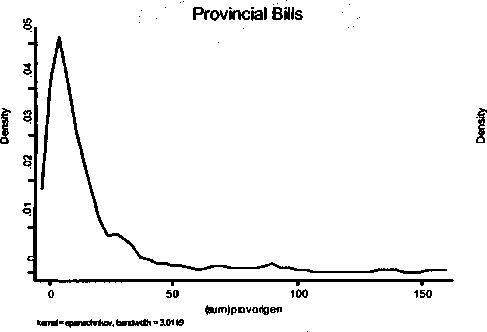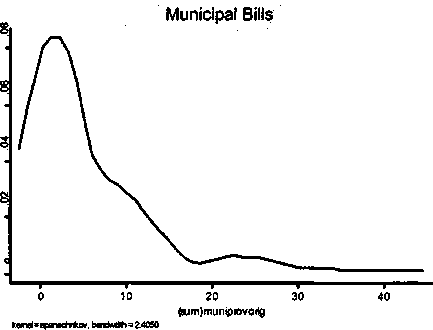94
legislator in time f as a second indicator. This variable ranges between zero and one and
normalizes the differences among individuals that de facto have a dissimilar
predisposition for bill drafting.

Figure 7.1: Distribution of Provincial and Municipal Bills

I also decided to use another of the main covariates of previous models:
executive background. If, as stated, previous executive experience makes a difference in
legislative activity, it might also affect electoral performance in the near future.
Rephrasing the argument, a mayor that jumped to the House and expects to return for
his old position may have attributes (knowledge of constituents' preferences, well
established image) that make her likelihood of wining the spot different. Thus, I include
this covariate in the right hand side of the equation. However, descriptive statistics show
a very salient finding: only three former mayors and two former governors were able to
return to their old spots after serving in a legislative mandate. Table 7.3 and 7.4
demonstrate how clear the distributions are. Thus, the expected effect of these covariates
is likely to have a negative impact on the chances of winning, everything else equal.
More intriguing information
1. Macro-regional evaluation of the Structural Funds using the HERMIN modelling framework2. Volunteering and the Strategic Value of Ignorance
3. Fertility in Developing Countries
4. The ultimate determinants of central bank independence
5. Infrastructure Investment in Network Industries: The Role of Incentive Regulation and Regulatory Independence
6. The name is absent
7. The name is absent
8. Does Market Concentration Promote or Reduce New Product Introductions? Evidence from US Food Industry
9. A Note on Costly Sequential Search and Oligopoly Pricing (new title: Truly Costly Sequential Search and Oligopolistic Pricing,)
10. GROWTH, UNEMPLOYMENT AND THE WAGE SETTING PROCESS.